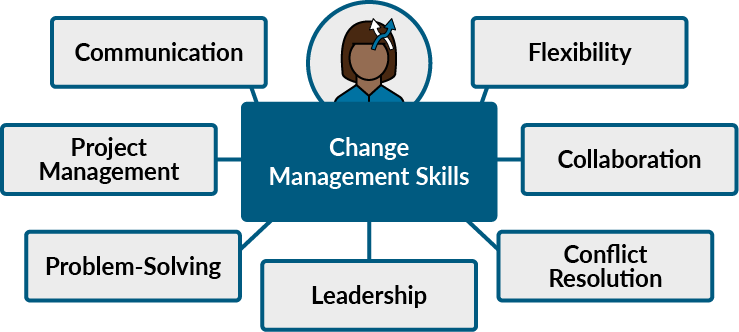Change Skills
Organizations need individuals with change management skills for several reasons. Firstly, change is inevitable in any organization, and individuals with these skills can help ensure that changes are managed effectively and efficiently. This can help minimize disruption and maintain the organization’s productivity and competitive edge.
Secondly, change can be challenging and disruptive for employees, and individuals with change management skills can help ease the transition by communicating the changes effectively and providing support throughout the process. This can help reduce resistance and increase buy-in from employees.
Finally, effective change management skills can help organizations stay agile and adapt to new circumstances or opportunities quickly. This can be especially important in today’s fast-paced and ever-changing business environment.
Overall, individuals with change management skills are valuable assets to any organization, as they can help manage changes effectively, reduce resistance, and maintain the organization’s productivity and competitive edge.
Change management skills refer to the abilities and knowledge necessary to effectively plan, execute, and manage organizational changes. These skills include but are not limited to communication, project management, problem-solving, leadership, conflict resolution, collaboration and flexibility.

- Communication: Effective communication is essential in any change management effort. Leaders need to be able to clearly communicate the reasons for the change, the benefits of the change, and how the change will be implemented. They also need to be able to listen to feedback and address concerns that may arise.
- Project Management: Change management initiatives are often complex projects that require careful planning and execution. Leaders with project management skills can help ensure that the change is implemented on time, within budget, and with the desired outcome.
- Problem-Solving: Change often involves addressing existing problems or identifying new opportunities. Leaders with strong problem-solving skills can help identify the root causes of problems and develop creative solutions to address them.
- Leadership: Change management requires strong leadership skills. Leaders need to be able to inspire and motivate others to embrace the change, even when it may be difficult or uncomfortable.
- Conflict Resolution: Change can often create conflict and resistance. Leaders with conflict resolution skills can help manage disagreements and work to find common ground, enabling the change effort to move forward.
- Collaboration: Effective change management often involves collaboration and cooperation among different stakeholders, such as employees, managers, and external partners. Collaborative skills enable individuals to work effectively with others, build consensus, and achieve common goals. In the context of change management, collaboration can help to ensure that everyone is aligned around the change effort and working towards its success.
- Flexibility: In the context of change management, flexibility refers to the ability to adapt to new situations and changing circumstances. Change is often unpredictable, and unexpected obstacles can arise during the change process. Leaders and team members who are flexible are able to adjust their plans and approaches as needed to successfully navigate these obstacles and ensure that the change process stays on track. This is a crucial skill in change management, as being rigid or resistant to change can hinder progress and cause the change initiative to fail.
Having these skills can help organizations successfully navigate change, adapt to new situations, and achieve their goals. They are also valuable for individual career development, as professionals with these skills are in high demand in many industries.